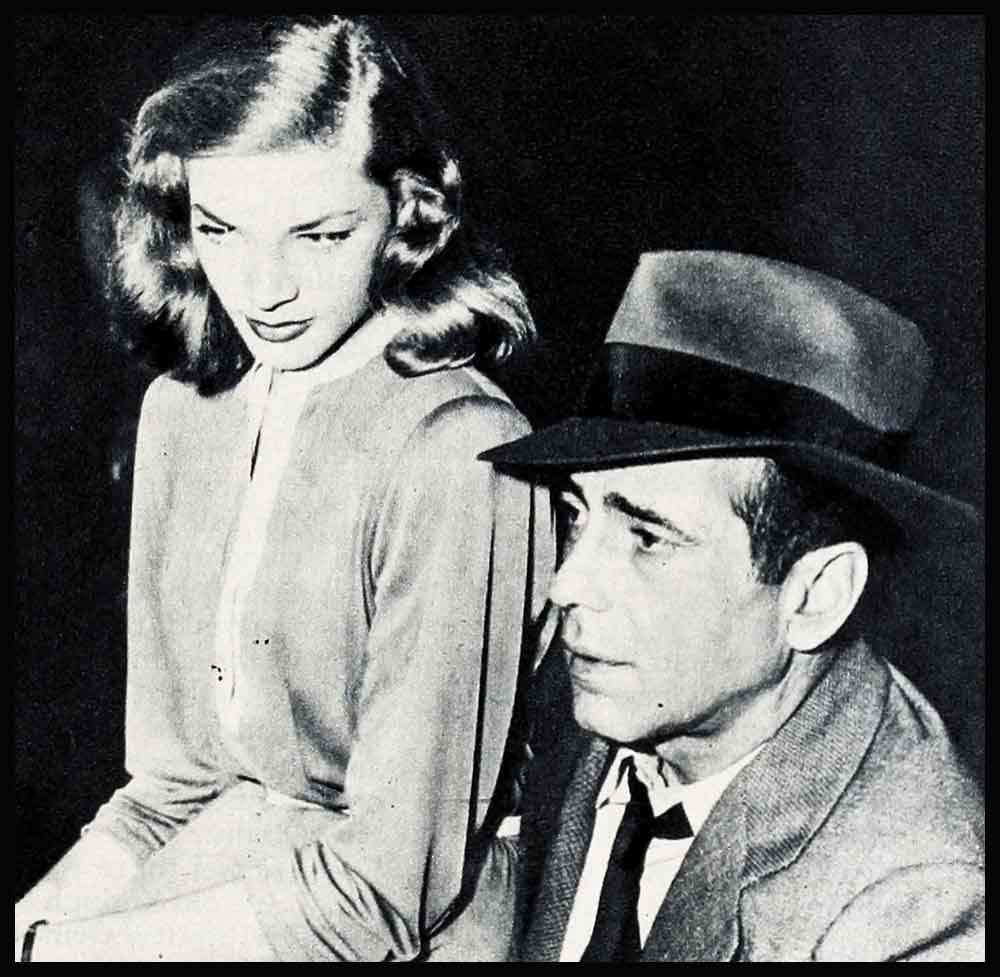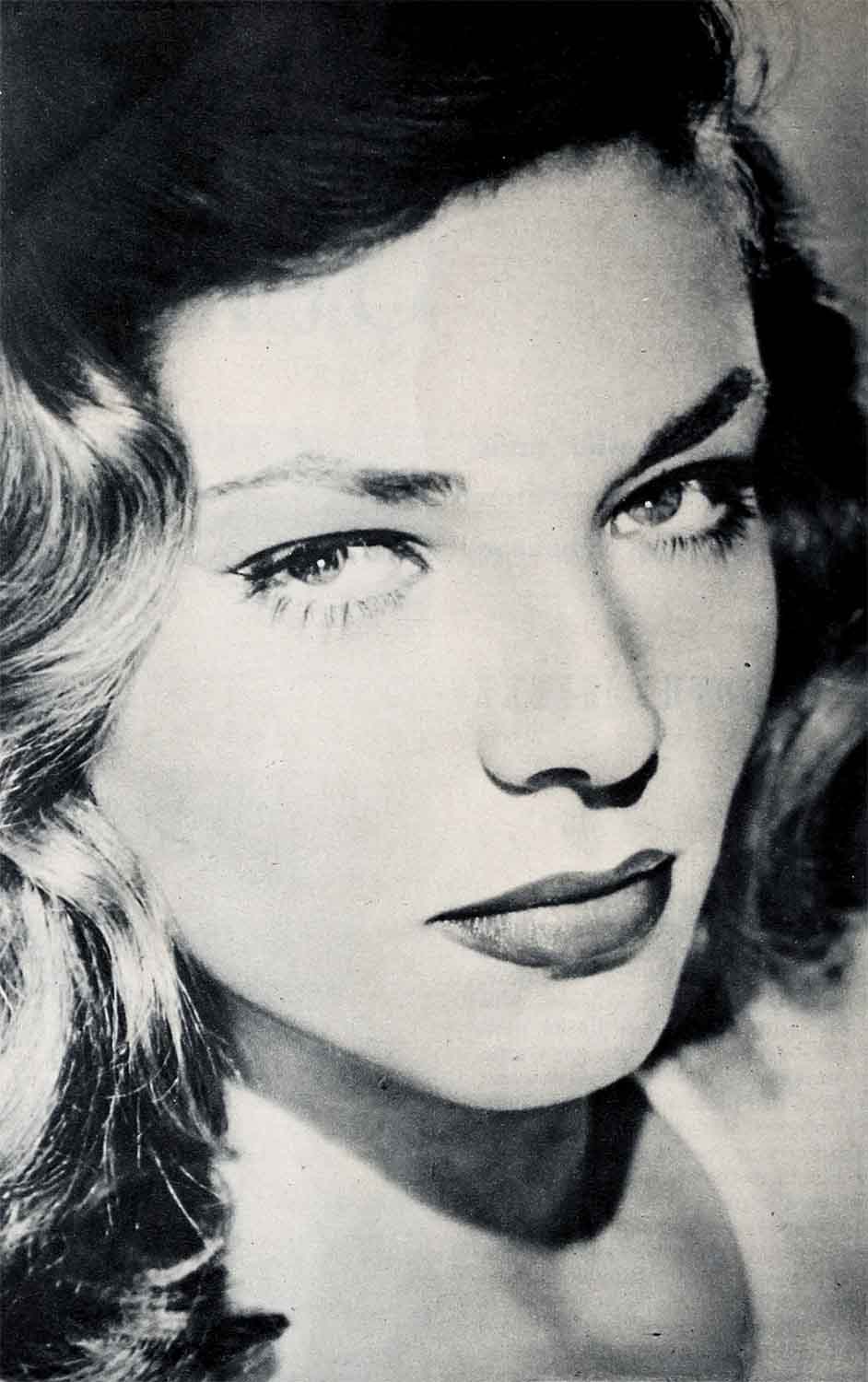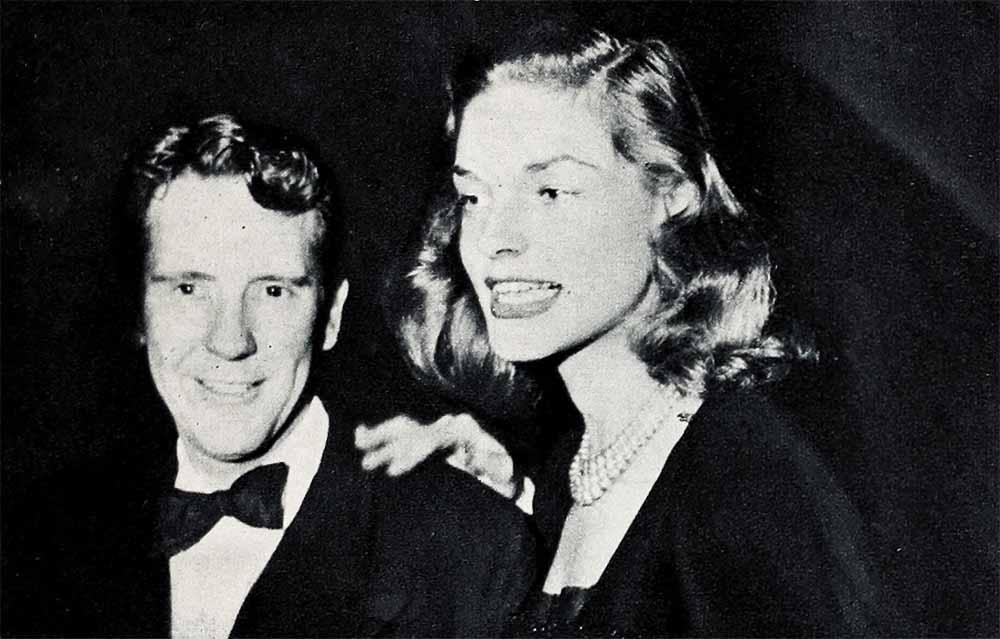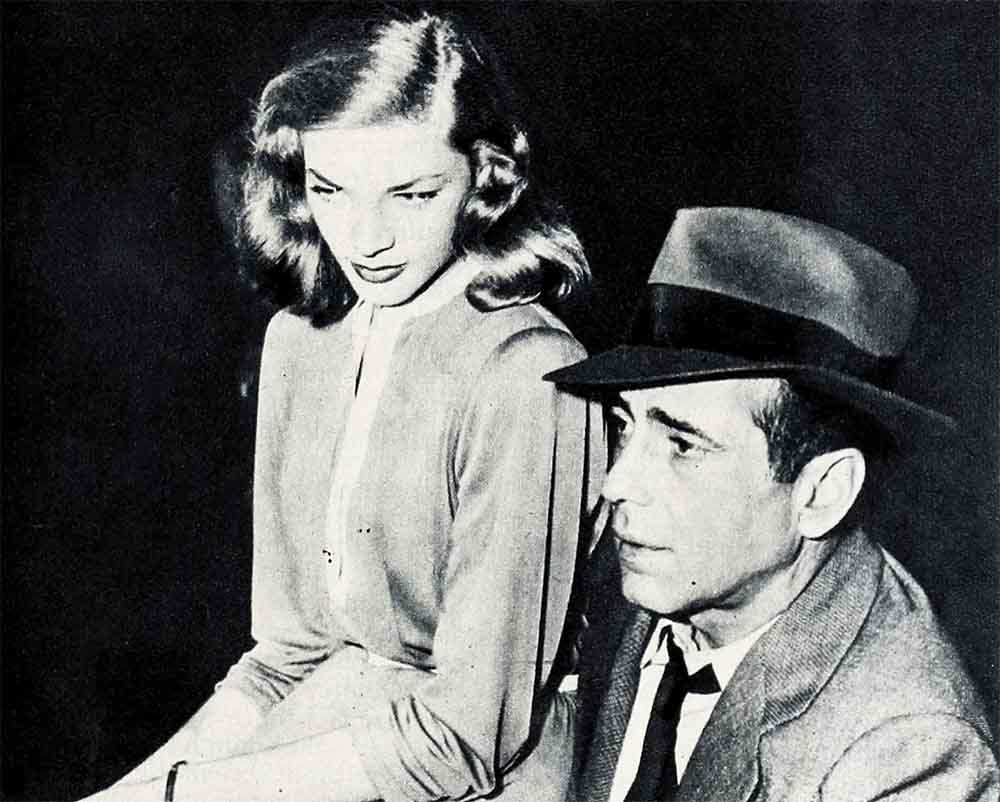
The Life Of “The Look”
HOLLYWOOD calls her a great find.
Bogie calls her “Charley,” or “Slim”—the character she played in “To Have And Have Not.”
Her mother, friends, the waitresses, policemen, grips and gaffers on the lot call her Betty, which certainly doesn’t suit her, but is her real name.
The town cut-ups started calling her “The Look,” on account of what she, amused at herself, describes as that “down-under” look which she uses with such sulphurous effect on the screen. And the name has taken hold like wildfire.
Others call her Lauren, a family name she adopted when she went on the stage, or—the tag of fame—just Bacall.
AUDIO BOOK
She has the whole town talking!
It began at the press preview of “To Have And Have Not” (starring Humphrey Bogart) in which newcomer Bacall walked, for the first time, onto the screen.
The impact was terrific.
In that star-accustomed audience, one heard the sharp sound of in-drawn breaths, felt the mounting excitement accorded only the fabulous or frightening.
Afterwards the critics gathered outside the projection room, where an extraordinary thing happened. Instead of the customary argument, the pros and cons of controversy, there was perfect unanimity when, as one man, they said:
“This Bacall girl has the makings of a Garbo!”
June Allyson, who admires her tremendously, summed up the general reaction when she said, “It was like being given the insulin shock treatment.”
The preview crowd dispersed, but the applause echoed on. Obviously it was time to talk to this Bacall girl.
When she came into the Green Room at Warner Brothers, a casual-looking youngster in a gray sports suit, a prune-colored sweater, moccasins and a somewhat derelict-looking raincoat slung—though the sun was shining—over her shoulders (“To give me,” she later explained, “that ‘casual’ look”), she looked ten years younger than she does on the screen. Actually, she was twenty on September 16, 1944, and about as hard-boiled and sophisticated as a college freshman.

“Hi,” said the Bacall girl.
Then, while she was ordering her lunch—cold turkey, avocado, black coffee—we sat, frankly staring, taking inventory of the face that has launched a million superlatives.
Pale tan hair, unevenly streaked by the sun and worn shoulder-length. Mouth extraordinarily large for beauty. But on her—beautiful. Teeth slightly uneven. Eyebrows that are as they grew. Eyes, gray-green, wide-spaced and set uniquely in her head. But eyes that look at you levelly. Not with that “down-under” look which, by the way, she says she “made up” herself, but uses only when after a job, or—on the screen—a man.
Please don’t get the impression that she doesn’t look, in life, as she does on the screen. All you have to do is add ten years to her, throw in some disillusioning experiences and there sits “Slim.” And why not? She played the part with “no alterations.”
“When I made my first test,” she said, “they wanted to round and thin my eyebrows, cap my teeth, change my hairline. Make my mouth up to look smaller. Glue on fake eyelashes. That’s when I said, ‘No alterations!’ If they’d insisted, I couldn’t have acted. Couldn’t have spoken a line. And would have been back in ‘blouses’—modeling for Harper’s Bazaar—where I came from. Not,” she added, “that I’m looks-conscious. I’m no raving beauty, and I know it. Just,” she laughed, “raving. But I’ve got to be me and not some other ‘creep’ (as Bogie would put it) when I do a job.
“Fortunately for me, I had Mr. Hawks on my side all the way, so I made the picture completely—except for very light make-up—uncamouflaged. And I’m doing the same in my second picture, ‘The Big Sleep,’ in which I’m again teamed with Bogie, again directed by Mr. Hawks and playing, of all things, a society girl!”
Speaking of fame, she says, “I’m not famous—yet. One picture isn’t enough to prove anything. Nor two. Fame,” said this Bacall girl, who sees things straight and sees them whole, “is something that must pyramid. But I see my name in the papers, hear it over the radio, see my face on magazine covers and it’s a little hard to believe this is me it has happened to. I always wanted it to happen. But never thought it would—like this.”

As a matter of fact—and record—Betty Bacall hadn’t any particular reason to suppose that it would happen “like this,” if at all. She says, of her childhood, “It was pretty dull”—and would like to let it go at that.
Born in New York City, Betty, her mother and grandmother lived in a series of apartments. One gathers that the going was not very good, or the environment glamorous. Betty’s mother worked—and still works— as a private secretary. Of her father she says, with a shut expression, “We don’t talk about him.” She didn’t like school, didn’t like to study “and never did,” but managed to graduate from The Highland Manor School for Girls, at Tarrytown-on-Hudson, the June before she was twelve and from the Julia Richmond High School in New York when she was fifteen.
Of her school days she remembers, and then with bored reluctance, only that she was “in some class plays,” loved the great outdoors, wasn’t “a bit femme,” once fell down a hill while riding her bike and got “pebbled legs.” Also, that she was stupidly sensitive, got hurt feelings easily. “I’d see two girls, heads together, whispering, and be sure it was about me, and brood over it.”
After Julia Richmond, Betty considered going to college. “But I suddenly changed my mind. Takes too long. Not necessary at all for actors. Anyway, I never do anything I don’t like to do, if I can help it. That I could help.”
When m middies and skirts, Betty had decided that acting was the thing she would like to do. Bette Davis, her favorite actress, was “the inspiration.”
By the time she’d graduated from Julia Richmond, she’d seen enough Davis pictures to be sure that it took training to be an actress. She put in a season’s study at the American Academy of Dramatic Arts and completed her pre-Hollywood training by playing small parts in two short-lived plays. One, “Johnny Two-By-Four,” never reached Broadway. The other, “Franklin Street,” had a run as brief as a breath. If talent scouts, on the prowl, caught the latter, they must now be weeping in their beards, for they overlooked Bacall.
But that arresting face and 119 pounds, five foot six and a half inches of nonchalant grace did impress one of the editors of Harper’s Bazaar. He gave the Bacall girl a job as a model, which proved to be a short cut to Hollywood.
“What happened,” said Bacall, “was that Mrs. Hawks saw my picture, modeling a blouse, in the Bazaar, called it to Howard’s attention. Howard called his agent, Charlie Feldman, asked Charlie to wire his New York office to look me up—and over. I was in Florida, at the time, for the Bazaar. Mr. Feldman’s New York office got in touch with my mother, who wired me. I’d never heard of Mr. Feldman and said ‘Let’s forget it.’ When I got back to New York, the Bazaar wanted me to be their representative for ‘Cover Girl,’ then being cast. Most of the magazines, as you know, had girls representing them.

“When I found I wouldn’t have a line to speak, I wasn’t interested. But after a lot of back-and-forth negotiations, finally decided to do it and was all set to go to Columbia at 3:30 one Tuesday afternoon to sign. Half an hour before I was to go, came this mad phone call from Feldman’s man. ‘Well, what about it?’ he asked. I’m about to sign with Columbia,’ I said. ‘Don’t,’ he shouted, ‘do a thing until I get there!’ When he ‘got there’ we put in a call for Mr. Feldman in California. Said Mr. Feldman, ‘Well, how soon can she get here?’ That same afternoon, they arranged transportation for me and I was in Hollywood three days later. I met Mr. Hawks. I made a test. I put in eight months of coaching. I read aloud for days and weeks so that my voice, which,” she grinned, “was not always as it is now, would smooth out and have more resonance. Mr. Hawks was in no hurry. He chose to prepare me carefully so that I might make my ‘debut’ in the ‘big league.’ Well,” said the Bacall girl, with her challenging grin, “I did.”
“Scare you—Hollywood?” we asked.
Bacall said, slowly, “I—don’t think—so. I love to act. I think I can act. To be allowed to act is all I want of Hollywood.
“One of these days someone is going to take a good look at me and say, ‘You’re in the wrong business!’ Because, I want none of the things the average young girl wants. I don’t want a lavish home. I don’t want expensive furs, cafe-society life or jewels. I don’t like sham.
“I like to wear slacks; would like to spend most of my life on a boat in dungarees and an old shirt just running around swabbing up the decks and polishing the brass. To me, a boat has all the peace there is—and that I must have!
“I’ve been in this town a year and a half and I’ve seldom been to night clubs. After I got out of high school, I hung around with actors, most of them struggling on Broadway. Later Mother and I had a little apartment in the Village— friends would come in and we’d go to a place called Shima’s for dinner, or a place called Jai Lai, two little Chinese restaurants . . . and then back to the apartment to talk till morning. That was more for me.
“Here, I spend a lot of time with Mr. and Mrs. Hawks and their friends. I like people older than myself. It’s why I don’t go out with young boys. My mother and I—and Droopy, my Cocker spaniel—have a little apartment, which shouldn’t happen to a canary. (Someday, we’ll have a house—in the Valley.) My friends come to the apartment. I’ve been told I’m too much of a recluse. Maybe I am.
“When I get to the place where people recognize me, ask for my autograph, I’m going to think it’s lots of fun. I like to give interviews when I can sit and relax like this. But my private life is my own. When people say, ‘Come on, who’s your real love-life?’—I just kid out of it. When I get married, that’s time enough to talk.”
Be it said in passing, such a time may not be far distant. Bogie himself made no bones about his regard for his new co-star when he told reporters recently in New York that he hoped to marry her when he was free. Lauren, however, has left most of the talking to Bogie, since the complications to their marriage are primarily his. In this, as in other things, she has not lost her sense of balance. Because, as she said:
“Balance is the important thing. I know that if something comes along that gets me all keyed up something else will happen that will take me down again. If it doesn’t, it should. For if ever my nose goes up in the air, I’ll do something drastic. If I ever forget that next week, next year, tomorrow, someone else will come along and be as ‘hot’ as I’m supposed to be now, if forgetting I had my break, I ever begrudge it to someone else—I’ll deserve to lose everything.
“The actors and actresses who have stayed big in this business are the swell people—people like Bette Davis, who is a perfectly marvelous woman. She’s been wonderful to me; she went to producer Henry Blanke and suggested me for ‘The Fountainhead.’ People like Annie Sheridan, Clark Gable, Joan Blondell, Bogie, too—everyone looks up to them.
“I’d like to be,” Lauren Bacall added, simply, “one of them.”
Well, it looks likely!
THE END
It is a quote. PHOTOPLAY MAGAZINE APRIL 1945
AUDIO BOOK




